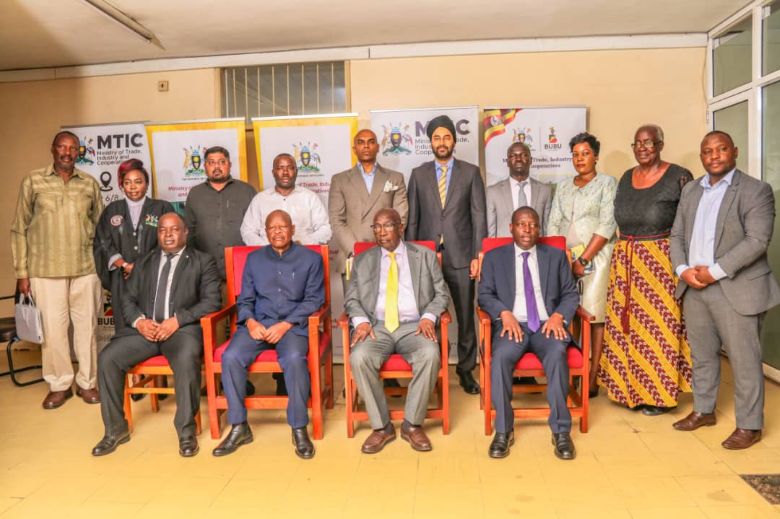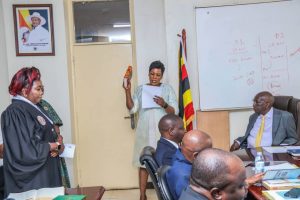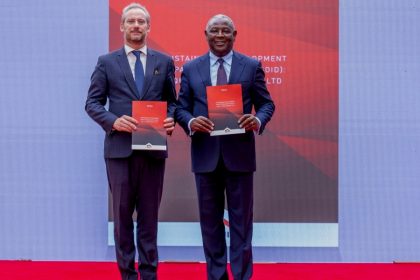Uganda inaugurates first sugar industry stakeholders’ council

Government targets transparency, competitiveness, and value addition in multi-billion shilling sector
The government has inaugurated the first Uganda Sugar Industry Stakeholders’ Council, marking what officials described as a “historic milestone” in the regulation and modernisation of one of the country’s most economically significant industries.
The council’s establishment follows the amendment of the Sugar Act earlier this year, providing a statutory framework to streamline licensing, pricing, and dispute resolution in a sector that contributes 5pc to Uganda’s GDP, employs over 170,000 people, and generates UGX 500 billion in annual tax revenue.
Presiding over the inauguration, Hon. Francis Mwebesa, Minister for Trade, Industry and Cooperatives, said the council would play a central role in aligning Uganda’s sugar production with both domestic and export market needs, while safeguarding fairness among growers and millers.
“The Council has critical responsibilities in the development of the sugar industry, including promoting market access, facilitating equitable pricing, and mediating disputes,” Mwebesa noted. “It must exercise its powers judiciously and avoid monopolistic tendencies.”
The minister added that Cabinet had directed the Ministry to submit quarterly progress reports on the council’s performance, signaling tighter oversight and an intent to ensure the reforms produce measurable results.
Under the Sugar (Amendment) Act No. 6 of 2025, the Council will operate as a corporate body, with authority to review mill licensing, recommend investment approvals, develop a national sugar industry master plan, and represent Uganda in regional and international sugar trade forums.
It comprises 11 members, including representatives from the Ministries of Finance, Agriculture, and Industry; four from the out-growers’ associations; and three from sugar millers. The first council’s tenure will run for two years, after which new members will be appointed.
According to the Permanent Secretary, Ministry of Trade, Industry and Cooperatives, the establishment process involved wide consultation with both growers and millers before Cabinet approved the nominees on October 6, 2025.
 Speaking at the same event, Hon. David Bahati, Minister of State for Industry, hailed the council’s inauguration as a sign of institutional maturity within Uganda’s industrial policy framework.
Speaking at the same event, Hon. David Bahati, Minister of State for Industry, hailed the council’s inauguration as a sign of institutional maturity within Uganda’s industrial policy framework.
He revealed that Uganda’s sugar production now stands at 700,000 metric tons annually, with 450,000 tons consumed locally and 250,000 exported.
Bahati emphasized that the next phase of transformation lies in industrial sugar production, which would reduce imports by domestic manufacturers.
“The most important value addition ahead is in industrial sugar,” Bahati said. “This will not only strengthen linkages with manufacturing but also secure our balance of trade.”
He added that the sector’s achievements reflect the government’s broader “10-fold growth program”, which seeks to anchor industrialisation as a driver of sustained economic expansion.
Analysts have welcomed the creation of the Council as a potential stabiliser for an industry long plagued by disputes over zoning, pricing, and competition. Previous regulatory gaps had left the Ministry with limited authority to mediate conflicts between large sugar firms and independent cane growers.
By institutionalising representation and arbitration, the new framework could help defuse tensions while enhancing competitiveness and compliance with regional trade standards.
However, experts also caution that effectiveness will depend on how transparently the Council operates and whether political neutrality can be maintained. “Uganda’s sugar sector needs more data-driven governance and less lobbying,” one industry observer noted. “The Council’s independence will be the real test.”
For now, the inauguration symbolises renewed optimism. With statutory backing, Cabinet oversight, and clearer roles for all players, the Uganda Sugar Industry Stakeholders’ Council represents a structural shift — from ad hoc regulation toward institutional coordination — in a sector that remains vital to Uganda’s industrial and agricultural future.


 Equity Group sustainability projects impact over 400,000 households in 2024
Equity Group sustainability projects impact over 400,000 households in 2024
 World Bank sees farming as key to unleashing income growth at scale
World Bank sees farming as key to unleashing income growth at scale
 COMESA Competition Commission tightens oversight on mergers and consumer protection
COMESA Competition Commission tightens oversight on mergers and consumer protection
 Africa needs new growth model amidst rising Gen-Z agitation
Africa needs new growth model amidst rising Gen-Z agitation
 Cheers and fears as Uganda braces for transition from LDC status
Cheers and fears as Uganda braces for transition from LDC status
 Sustainable architecture, creative economy, take centre-stage at USA annual symposium
Sustainable architecture, creative economy, take centre-stage at USA annual symposium
